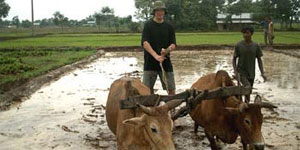AGRO TOURISM
 Itrek Nepal has always given importance to Agro Tourism with the aim of showcasing new areas and promoting and developing the life style and economy of indigenous people residing in rural area. Nepal is known as an agricultural country and more than eighteen percent of its people are involved in farming. The fact is to be considered that they toil hard but are not able to get expected benefit in lack of modern technology and techniques. Our company believes that agro tourism allows you to be in close contact with the inhabitants of small rural villages being involved in traditional way of agriculture in this century. You can find out how food grains are harvested, sorted and preserved, how vegetables can be grown organically, how freshly picked fruits are turned into delicious marmalades, how goats are milked, cheeses are made, and so on... Itrek Nepal has always given importance to Agro Tourism with the aim of showcasing new areas and promoting and developing the life style and economy of indigenous people residing in rural area. Nepal is known as an agricultural country and more than eighteen percent of its people are involved in farming. The fact is to be considered that they toil hard but are not able to get expected benefit in lack of modern technology and techniques. Our company believes that agro tourism allows you to be in close contact with the inhabitants of small rural villages being involved in traditional way of agriculture in this century. You can find out how food grains are harvested, sorted and preserved, how vegetables can be grown organically, how freshly picked fruits are turned into delicious marmalades, how goats are milked, cheeses are made, and so on...
Nepal has plenty of natural resources, which makes agro-tourism more popular and fascinating among tourists. During the summer season you will be exhilarated to see the farmers being involved in rice plantation. The techniques they follow for plantation and harvesting differs from one region to another. The laborious farmers turn their field into an opera theatre where they sing local songs and exchange funny remarks to avoid the sluggishness and sense of hard work. In winter season fields are adorned when wheat plant starts sprouting across the land. Not limited to this, every season is rich in its agricultural product and provides the tourists a life time experience.
Rice, wheat and maize are the major crops of Nepal. Farming systems and crop production in Nepal vary across the agricultural zones. Physically, the country is divided into four ecological strata: the southern terai plain; the southern mountain ranges; the central hill complex; the northern great Himalayas. Rice-based cropping systems, with wheat or maize as a secondary crop, are predominant in the terai and middle hills, whereas in the high mountains maize, millet, barley and buckwheat are cultivated. Tea, cardamom, ginger and coffee are the important cash crops of the middle hills. Likewise, wide ranges of temperate fruits in the high mountains; citrus in the middle hills; tropical/subtropical fruits are also grown in the terai and middle hill valleys. Vegetable-growing in kitchen gardens is practiced at all elevations. In addition to this Livestock is an important component of the Nepalese farming system providing food for humans, manure for plants, and draft power for farms and cash income for farm families. Cattle, buffaloes, sheep, goat, pigs and poultry are the livestock species reared across different agricultural zones.
Agro tourism has various different economic and socio cultural aims. The basis of the program is the revitalization of the countryside and reversal of urban trend. It brings tourists to the countryside instead of over populating cities. You can meet lovely and hard working people of rural area, share a meal with them, stay at their houses as family guests, taste their local drink and see them carry on with life graciously. In addition, to the heartwarming hospitality, you will also witness some of the most spectacular views of the mountain landscapes or heritage sites along the way.
Our company truly shares its profit gained by selling the specific packages with the local community. The purpose of this profit sharing is to encourage them to turn their traditional agricultural skill into modern one. In this relation we frequently conduct training and workshop to educate and empower the local community and be a part of their development process. |
|